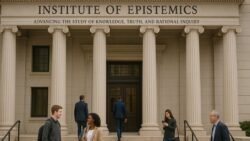Philosophy and Logic – Bridging philosophy, logic, and science is central to the academic vision of institutions like CGSP College, where students are encouraged to move beyond memorization and explore the deeper foundations of human knowledge. Philosophy nurtures critical reflection on existence and values, logic provides a structured way to evaluate reasoning, and science brings empirical methods to test and validate ideas. Together, these fields create a multidisciplinary framework that challenges learners to ask: How do we know what we know? This inquiry not only sharpens intellectual curiosity but also equips students with the ability to analyze complex issues through multiple lenses. At a time when information is rapidly expanding, the integration of these disciplines allows students to filter truth from misinformation, build ethical perspectives, and apply scientific rigor to real-life challenges. Such an education model prepares graduates to lead with clarity, integrity, and adaptability in a knowledge-driven society.

The Role of Philosophy in Understanding Knowledge
Philosophy remains a cornerstone in the pursuit of knowledge, offering timeless methods to question assumptions and interpret meaning. Through the study of epistemology, the branch of philosophy that focuses on the nature of knowledge, students examine what counts as truth, belief, and justification. Classical thinkers like Plato and Aristotle laid the foundation for debates on rationalism and empiricism, while modern philosophers such as Immanuel Kant and Bertrand Russell expanded the discourse on human perception and logic. At CGSP College, students are introduced to these traditions and encouraged to apply them to contemporary issues such as ethics in artificial intelligence or justice in global governance. By engaging with philosophy, learners not only gain insight into intellectual history but also learn to challenge biases and cultivate open-mindedness. According to the Stanford Encyclopedia of Philosophy, philosophy equips individuals to distinguish between knowledge, opinion, and misinformation—an essential skill in today’s fast-paced digital era.
The Precision of Logic in Academic Inquiry
Logic provides the structure and discipline that underpins all rational thinking. It helps students distinguish between sound arguments and fallacies, ensuring that reasoning is not clouded by emotions or assumptions. From symbolic logic that relies on mathematical expressions to practical logic applied in debate and research, this discipline forms the backbone of coherent academic writing and scientific analysis. In classrooms at CGSP College, learners use logic to evaluate arguments, solve puzzles, and even construct computer algorithms. The systematic approach of logic makes it a bridge between philosophy’s abstract questions and science’s empirical demands. For instance, logical reasoning is integral to programming languages and data interpretation, both vital in modern education and employment. Resources like the Internet Encyclopedia of Philosophy highlight how logic continues to evolve as an essential tool for critical thinking and decision-making. With these skills, students graduate with sharper analytical abilities, capable of addressing challenges in law, technology, and social sciences.
Science as a Path to Evidence-Based Knowledge
Science adds the element of empirical verification to the human quest for understanding. Unlike philosophy’s theoretical exploration or logic’s structural reasoning, science emphasizes observation, experimentation, and replicability. Students at CGSP College are encouraged to explore scientific methodologies, whether in physics, biology, or social sciences, to understand how theories are tested and validated. The scientific method empowers them to move from hypothesis to conclusion in a systematic manner, ensuring objectivity and reliability. This approach not only helps learners in academic pursuits but also cultivates a mindset suited to solving societal problems such as climate change, public health crises, or technological innovation. According to the Encyclopedia Britannica, science thrives on falsifiability and continuous questioning, which aligns with the college’s mission to nurture inquiry-driven education. When combined with philosophical inquiry and logical structure, science creates a complete framework for approaching the deepest questions of life and reality.
Integrating Philosophy, Logic, and Science in Education
The integration of philosophy, logic, and science fosters a holistic education that empowers students with intellectual depth and practical skills. At CGSP College, this approach manifests in courses that blend critical thinking, structured reasoning, and evidence-based research. Students are not limited to theoretical debates but are also encouraged to apply these principles in real-world contexts—whether in analyzing public policy, understanding ethical dilemmas in technology, or contributing to community development. This multidisciplinary perspective mirrors global academic trends, where problem-solving increasingly requires collaboration across fields. For example, ethical considerations in artificial intelligence require philosophical grounding, logical consistency, and scientific evaluation. Resources like Scientific American emphasize how modern challenges demand such integrative thinking. By fostering this balance, CGSP College ensures that its graduates are not only knowledgeable but also wise, prepared to lead with both reason and empathy in today’s interconnected world.





